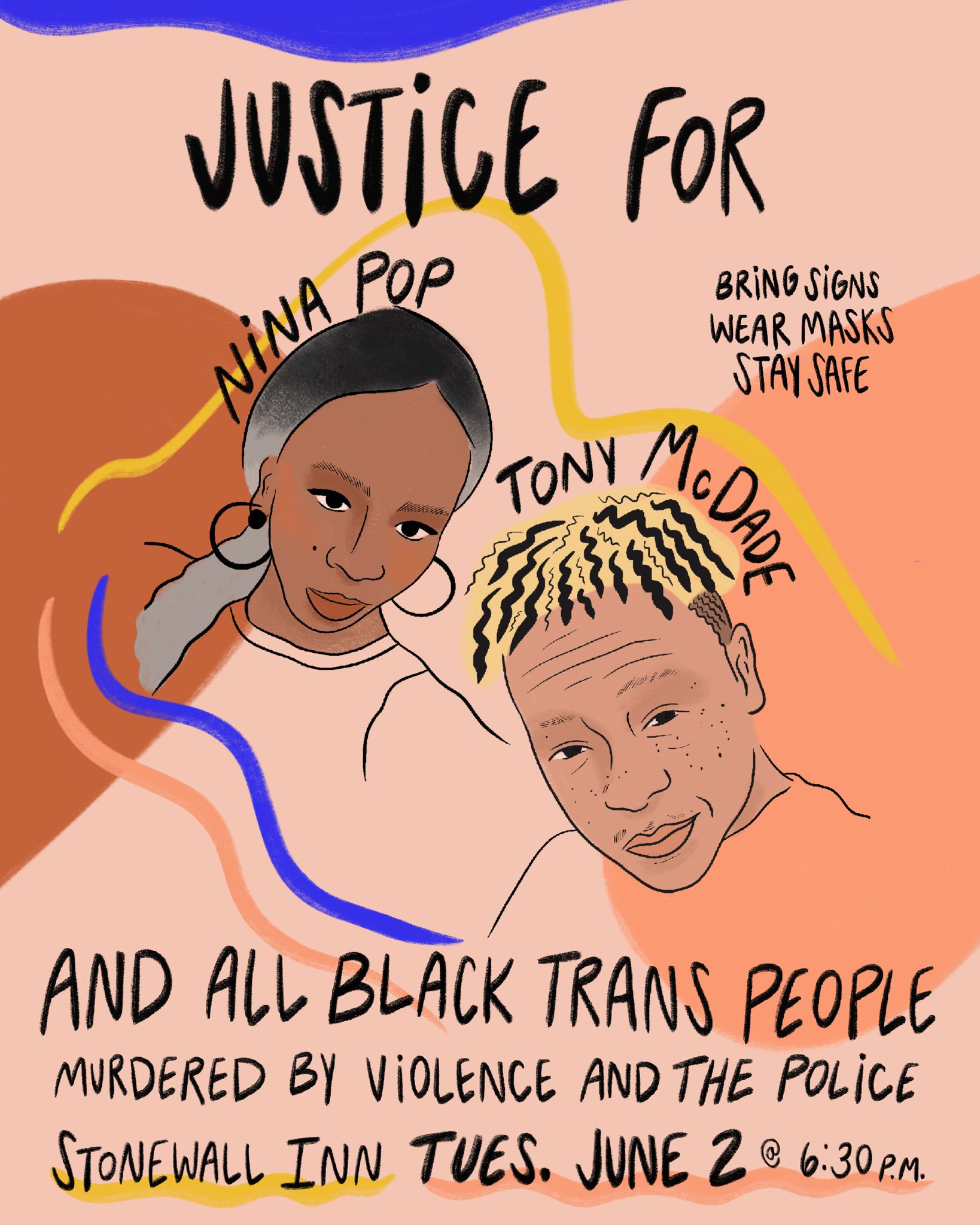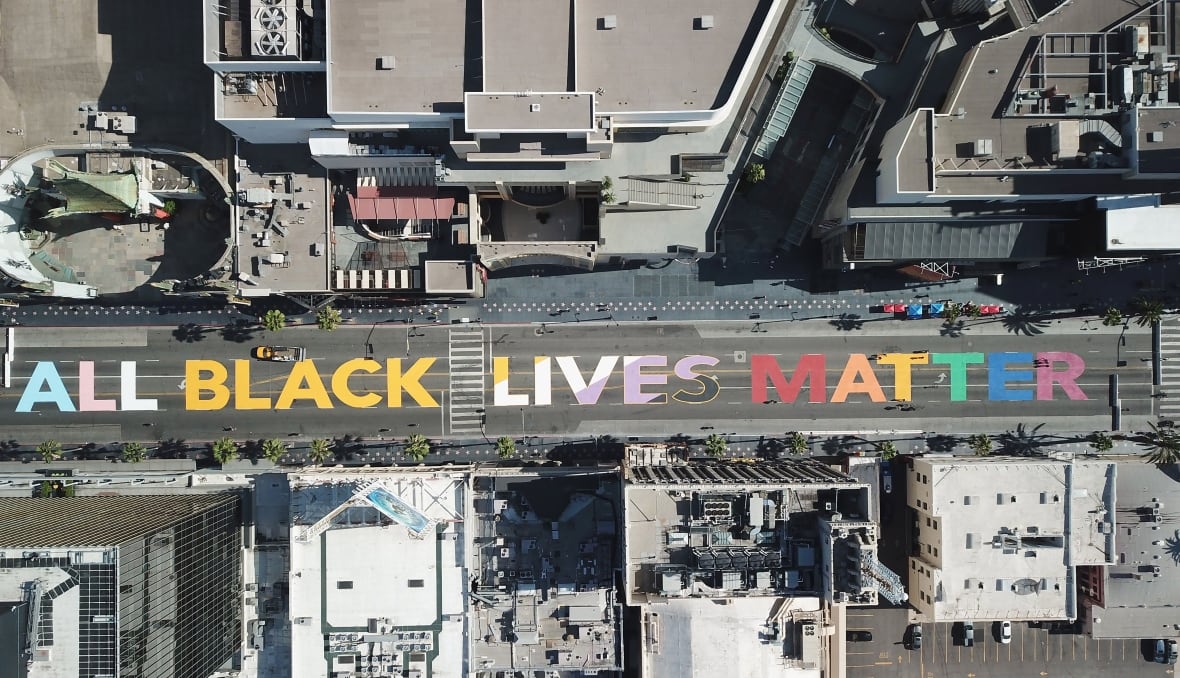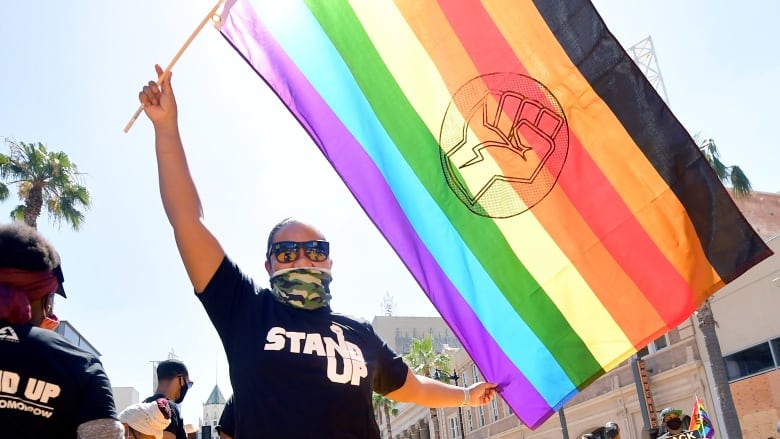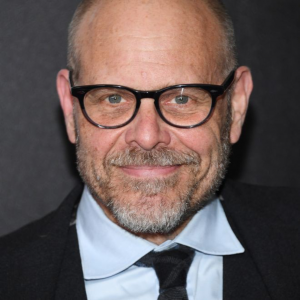Activists say a shift in conversation is sending Pride back to its roots of protest
As the fight against anti-Black racism spilled into Pride month, protests like the All Black Lives Matter Solidarity March in Los Angeles, pictured on June 14, evolved to include the voices of Black LGBTQ people. (Matt Winkelmeyer/Getty Images)
For decades, Nik Redman felt that as a Black transgender man, he had to leave a part of himself behind depending on what room he was in.
But the long-time Toronto activist says the recent wave of protests give him hope that things are beginning to change.
“There’s definitely a coming together. There’s been recognition [of] who has been left out of the picture,” said Redman, 50.
As protests against police violence, spurred by the May 25 killing of George Floyd, spilled into Pride month this June, the rallying cry of “Black Lives Matter” became “Black Trans Lives Matter,” “For All Black Lives” and “All Black Lives Matter.”
Activists fighting for the recognition of violence against Black LGBTQ people say the change has been a long time coming.
“I think it’s about time that we’re finally having a conversation — and a meaningful conversation — about justice that’s needed for Black trans communities [and] for Black queer communities,” said Rodney Diverlus, a founding member of Black Lives Matter Toronto.
“It’s easy to talk about the experiences of unarmed Black men but … now we’re seeing a shift. It’s not just about cisgender Black men.”
Shift in focus
Take the June 2 march that started in front of the Stonewall Inn in New York City, the site of a historic uprising by the LGBTQ community in 1969.
This time, thousands gathered to protest the killings of Black trans people — at the hands of police and others.
One of the faces on a widely circulated flyer was that of Tony McDade.Decrim NY #FreeThemAll@DecrimNY
Stonewall was a police riot
TOMORROW: Take to the streets to uplift Black trans people killed by state + interpersonal violence
Our movement against state violence must reject gendered violence + our movement against gendered violence must reject state violence : @SarahWasko
: @SarahWasko

256Twitter Ads info and privacy130 people are talking about this
On May 27, police in Tallahassee, Fla., shot and killed McDade, a Black trans man who they said was a suspect in a fatal stabbing earlier that day.
While his death did receive some attention, activists say the voices of Black LGBTQ people are often erased from mainstream media coverage.
“Contemporary protest politics are much more easily mobilized and make their presence felt in the face of the death of a George Floyd than they would in the face of the death of a Tony McDade,” said Rinaldo Walcott, a professor at the University of Toronto whose research focuses on Black diaspora culture, gender and sexuality.
Walcott credits the ’80s activism of Black queer women such as Audre Lorde in the U.S. and Dionne Brand and Makeda Silvera in Canada for the shift in focus happening now.
Diverlus, too, is quick to point out that when Black Lives Matter was founded in 2013 as a response to the acquittal of George Zimmerman, who fatally shot Trayvon Martin, an unarmed Black teenager, it was founded by Black queer women. As was the case for the Toronto chapter.

“I’m the only dude on the team,” Diverlus laughed.
“We recognize that the leadership needed in this moment to talk about Black resistance needs to be women, needs to be queer people and needs to be trans people. People who have experienced racism and oppression the most.”
A return to Pride’s roots
While in-person Pride celebrations in Toronto have been replaced with virtual events in light of the COVID-19 pandemic, some in the community say the current climate and ongoing protests have sent Pride back to its roots.

“This year is a reminder of what Pride is about,” said Raven Wings, a Black trans activist at a Black Lives Matter demonstration marking Juneteenth, the celebration of emancipation from slavery, in front of Toronto Police headquarters.
“It’s a revolution … people taking to the streets and celebrating their lives.”
In Vancouver, police have been barred from all Pride events this year and in future.
For Cicely Belle Blain, an anti-racism consultant and founder of Black Lives Matter Vancouver, it’s a turning point in a city where she hasn’t always seen large-scale acknowledgement of anti-Black racism.
“Something anti-racist like this to galvanize such a big crowd is really quite powerful and for myself as a person of colour living in Vancouver,” Blain said. “It feels good to have that citywide support.”
WATCH | Vancouver anti-racism activist’s hope for the future:

Watch
Keeping momentum of Black Lives Matter protests going
- 4 days ago
- 0:38
Cicely Belle Blain, an anti-racism consultant in Vancouver, is encouraged by the large numbers of people attending anti-Black racism protests but hopes they will continue to make the effort to understand the unique experiences of those who are Black and queer after the demonstrations subside. 0:38
In a statement explaining their decision to bar police, the Vancouver Pride Society referenced recent protests as well as the Stonewall riots.
“The roots of Pride are in righteous anger, riot and uprising against police brutality,” the statement read.
“These riots against the violence of the police were led by Black and Brown trans women and queer people.”
Movement comes full circle
Elle Hearns just celebrated the first anniversary of the Marsha P. Johnson Institute, an advocacy organization she founded to defend the rights of Black trans people and highlight the work of its namesake, a Black trans woman at the forefront of the gay liberation movement in the late ’60s.
“She is most known and most famous for being the woman who really catapulted the Stonewall Rebellion,” Hearns told CBC News from her office in Columbus, Ohio.
“But, for myself, she’s so much more. She was an amazing, brilliant leader. She was an amazing organizer. And she was someone who certainly believed in abolition.”
For Hearns, the new rallying cry of “All Black Lives Matter” is a long overdue nod to the marginalization Black trans people fighting racism have faced from their own communities.
“It is a moment where I think we have come full circle. I don’t think we’ve recognized that for many, many years, Black people who happen to be trans have been fighting for our causes and fighting for the issues that we face as Black people … and to be recognized by Black people.”
Making space
When Redman sought out the LGBTQ community in Toronto in the ’90s, the mainstream scene was mostly white. Black queer and trans people saw the need to carve out their own space.
It’s what led members of Toronto’s Black LGBTQ community to form Blackness Yes, a committee celebrating Black queer and trans history and activism, and start Blockorama in 1999. It’s now the longest running stage at Toronto Pride and was the first dedicated to the Black diaspora.
When they weren’t able to get a float in the parade, they held their first event in a parking lot on Wellesley St. instead. Redman volunteered with Blockorama in its first year and has since been involved as an organizer.
“It was like a block party,” said Redman, noting that gradually, the space expanded.
“Now we don’t even fit into that parking lot. We have a huge lineup.”
Over the years, Blockorama has attracted popular headlining acts like En Vogue, Big Freedia and Mya. Despite its success, Redman says the event wasn’t always valued the way it is now.
“It’s been challenging working with Pride Toronto because they also failed to recognize the contributions of the Black queer community here in Toronto, the Black trans community,” he said.
WATCH | A taste of Blockorama:
“We were actually removed from Pride, from that stage, for a number of years.”
According to Redman, once TD Bank stepped in to sponsor the parking lot space, Pride made it the festival’s main stage and pushed Blockorama out in 2007, forcing the event to relocate multiple times over the next few years.
BLM protest halts Pride parade
That’s why when Black Lives Matter Toronto temporarily halted the 2016 Pride parade with a sit-in, the group not only asked for the removal of police involvement but also more funding for Blockorama and other community stages like Black Queer Youth and the South Asian stage.

“We saw hypocrisy in wanting to honour Black activism without honouring the very Black queer and trans people that are doing work in the community every day,” Diverlus said.
Amber Moyle, director of sponsorship and strategy at Pride Toronto, told CBC News in a statement that the organization met with Blockorama and Blackness Yes a few days ago to discuss anti-Black racism and Pride.
The statement also said the current organizers were not involved in the decision to move the Blockorama stage.
“You have to own the history of the organization and answer for it even if you were never part of those decisions, ” Moyle said. “We are not aware as to the specific reasons why the collectives were forced to relocate.”
Moyle said she was glad to see the decision had been corrected and that Blockorama was back at their chosen stage on Wellesley.
Pride Toronto released an anti-racism statement on June 19 with a list of initiatives, including support for defunding the police.
Passing the torch
Redman has been taking part in protests since the ’80s and remembers marching against South African apartheid in his hometown of Ottawa.
He’s optimistic about where the movement is headed.
“There have been pioneers before me,” Redman said. “And I think folks like myself who might be a bit older can also learn from people who are younger.
“It takes a lot of us to come up with some answers and solutions to problems that we’ve had for a very long time.”
WATCH | Black Lives Matter movement has thrust Pride back to its roots of protest:

Watch
Black LGBTQ activists bring Pride back to its protest roots
- 3 days ago
- 4:18
- Turn captions on
As protests against police brutality and anti-Black racism spill into Pride month, Black LGBTQ activists are drawing attention to the lives and voices often left out of the picture with the phrase “All Black Lives Matter”.4:18





